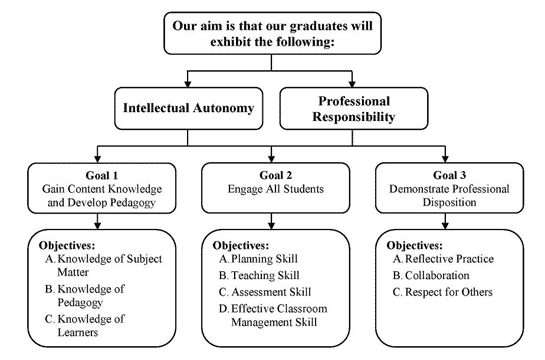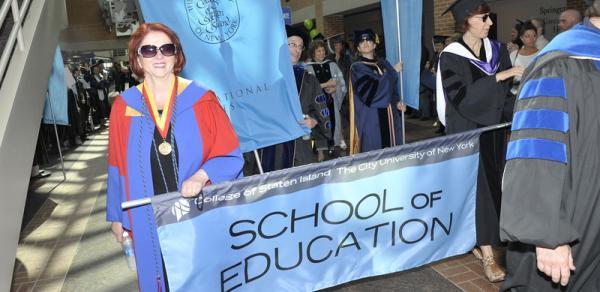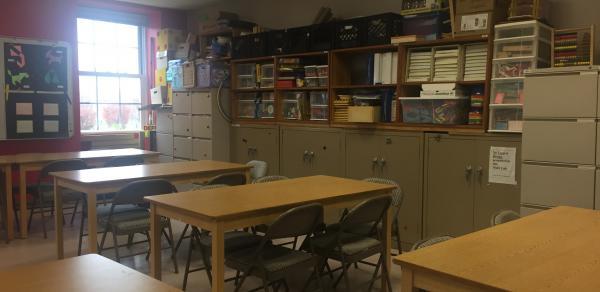School of Education Vision Statement
Graduates of the CSI School of Education continually examine what, how, why and who they teach. They embody compassion, empathy and respect for what every individual brings to the learning experience. They believe that all students can learn and that students’ learning potential is unknown and not pre-determined. They believe that the goal of the teacher is to develop students’ minds as powerful thinkers and problem-solvers. They view education as a profession in which practice and theory interact continually and dynamically to guide curriculum, pedagogy, and educational leadership.
School of Education Mission Statement
The School of Education prepares highly qualified, caring, and effective educators to meet the needs of students in diverse settings within the State of New York and beyond. We do so by linking theory, scholarship, and social justice. Our programs emphasize equity, academic excellence, reflective practice, curriculum integration, and advocacy. The programs promote meaningful fieldwork in which pre-service and in-service teachers engage with students, families, and other educators within diverse communities. Our students conduct research, understand educational policies, and develop the skills required to meet the needs of all students. Through their courses and fieldwork, our students develop the dispositions that guide and support their teaching and leading.
School of Education Goals
To actualize our vision and mission, we engage with our students in the classroom and in the field to:
- Truly listen to one another and see the world from different perspectives.
- Recognize how race, ethnicity, class, gender, family, and context shape human values and experience.
- Understand the relationship between students’ academic achievement and their emotional well-being.
- Demonstrate dexterity in their use of curriculum theory, pedagogy, and assessment practices.
- Create classroom environments that respect all students and meet the needs of all learners.
- Conduct research with students, educators and school communities to generate new knowledge and strategies that contribute to the field.
- Critically analyze and thoughtfully engage in conversations around current educational policies that impact teaching and learning in classrooms.
- Develop professional dispositions that help them to recognize and utilize the “funds of knowledge” of culturally and linguistically diverse families and communities.
- Teach and lead in a wide range of local, state, regional, national, and international settings.
See below for specific discipline Mission Statements.
Goals and Objectives of the Conceptual Framework

In order to achieve our primary purpose of preparing educators who possess intellectual autonomy and professional responsibility, our work centers on three goals and their respective objectives:
Goal 1: Gain Content Knowledge and Develop Pedagogy - Acquire an understanding of subject matter across the curriculum and apply it in pedagogically appropriate ways.
Objective A: Knowledge of Subject Matter. Demonstrate an understanding of the discipline, its central concepts, principles, and processes of inquiry.
Outcome - Demonstrate breadth, depth, and accuracy of knowledge in the content area.
Objective B: Knowledge of Pedagogy. Design and implement instruction that demonstrates an understanding of the discipline, its central concepts, principles, and processes of inquiry.
Outcome - Present subject matter to others in effective, concrete, and conceptual terms.
Objective C: Knowledge of Learners. Demonstrate knowledge about child or adolescent development.
Outcome 1 - Demonstrate knowledge of cognitive styles and abilities
Outcome 2 - Demonstrate knowledge of recognition of a variety of characteristics of children (e.g., culture, language, family).
Goal 2: Engage All Students - Design and implement instruction that motivates and engages all students.
Objective A: Skill of Planning. Plan instruction using various strategies that reflect an understanding of the cognitive, affective, and physical characteristics of each learner.
Outcome 1 - Develop lesson plans, including attention to planning for diverse learners.
Outcome 2 - Integrate ongoing, short-term plans with long-term goals and learning objectives that meet state standards.
Outcome 3 - Consider alternatives in the event that the plan needs adjusting.
Objective B: Skill of Teaching. Implement effective teaching/learning strategies.
Outcome 1 - Effective use of a variety of teaching methods.
Outcome 2 - Implement and modify instructional strategies that promote cognitive, social, and personal development of all students.
Outcome 3 - Accept and incorporate students' ideas and questions into the lesson.
Outcome 4 - Integrate technology into the curriculum.
Objective C: Skill of Effective Classroom Management. Encourage respectful behavior from students.
Outcome 1 - Use effective classroom management techniques.
Outcome 2 - Create a learning environment that encourages positive interactions.
Outcome 3 - Encourage responsibility and leadership.
Objective D: Skill of Assessment. Assess the relationship between instruction and student learning and adopt assessment practices that result in meaningful feedback and student accountability for learning.
Outcome 1 - Select and administer a variety of assessment tools.
Outcome 2 - Use initial and ongoing assessment to guide instruction.
Outcome 3 - Use assessment information to identify supports and adaptations.
Outcome 4 - Use information from multiple assessments to measure instructional impact over time and make necessary adjustments to instruction.
Goal 3: Demonstrate Professional Dispositions - Conduct oneself in contextually appropriate ways.
Objective A: Reflective Practice. Demonstrate continuous evaluation and monitoring of informed practices.
Outcome 1 - Demonstrate purposeful self-reflection (e.g., using journals, portfolios) to enhance students’ cognitive, social, and personal development.
Outcome 2 - Demonstrate purposeful self-reflection to advance teacher identity.
Objective B: Collaboration. Engage jointly with other professionals in reflective practice.
Outcome 1 - Participate jointly in professional activities.
Outcome 2 - Communicate and collaborate with P-12 students, colleagues, parents, agencies, and the larger community.
Objective C: Respect for Others. Develop positive school climates that reflect openness, mutual respect, support, and encourage inquiry.
Outcome 1 - Respect the rights and responsibilities of individuals in a democratic society.
Outcome 2 - Respect cultural, familial, and linguistic diversity.
Outcome 3 - Respect colleagues, family, and community members.
Literacy Discipline Mission Statement
The mission of the Literacy Discipline is to support our teacher education students in developing a strong theoretical understanding of literacy development and in enacting instructional practices that support students' literacy development at all grade levels and across the curriculum. Literacy includes the cognitive skills of reading and composing, as well as new literacies (digital literacy or "21st Century literacies") and multiple modes of literacy (for example, visual literacy). Our teacher education students will also become critically aware of how literacy is both a product of and a producer of the cultures within which it operates.
Science Discipline Mission Statement
The mission of the Science Discipline is to instill the understanding of the nature of science in the students we prepare as educators through the integration of the Scientific Practices as defined in the NYS MST Standards and the Next Generation Science Standards as listed below:
1. Asking questions
2. Developing and using models
3. Planning and carrying out investigations
4. Analyzing and interpreting data
5. Using mathematics and computational thinking
6. Constructing explanations
7. Engaging argument from evidence
8. Obtaining, evaluating, and communicating information can support higher
achievement in literacy and mathematics.
The Science Discipline program focuses upon scholarship centering on issues of educational practice, intense science content knowledge and pedagogical strategies in the preparation of science teachers and teacher educators. Emphasis is placed on the acquisition of scientific literacy so that students become inquisitive learners and effective problem solvers. Our mission is to enhance the relationship between science and society and to stress the concept of global citizenry to the future science educators in the program. Our faculty believes that improved scholarly practice will foster the continued expansion of scientific knowledge, recognizing the increasing impact of science and technology in our daily lives and on the environment.
Social Foundations Mission Statement
Social Foundations courses employ theoretical and methodological tools from at least one of several disciplines, including history, philosophy and sociology. The courses foster the development of a particular set of knowledge, skills, and dispositions significant to becoming a successful teacher. Specifically, Social Foundations courses develop candidates' knowledge of themselves and build their understanding of students, teachers, and schools and their communities, placing them all within the context of the larger society. The courses help candidates connect these understandings to their conceptions of what education means. In developing this knowledge, courses in the Social Foundations promote core skills of observation, listening, questioning, analysis, and argumentation. Finally, Social Foundations courses advance three important dispositions of prospective teachers: 1) civic engagement in issues that affect teaching and learning; 2) empathy for all students, families, and communities and; 3) an inclination to question prevailing assumptions about children and schooling. Through the acquisition, development, and demonstration of this set of knowledge, skills, and dispositions, the Social Foundations prepare candidates to confront the challenges of contemporary learning settings.
Social Studies Discipline Mission Statement
The Social Studies is the integrated study of the social sciences and humanities to promote civic awareness and engagement. Within the school program, the Social Studies provides coordinated, systematic study drawing upon such disciplines as anthropology, archeology, economics, geography, history, law, philosophy, political science, psychology, religion, and sociology, as well as appropriate content from the humanities, mathematics and natural sciences. The primary mission of The Social Studies is to help young people develop the ability to make informed and reasoned decisions for the public good as citizens of a culturally diverse, democratic society in an interdependent world. In essence, The Social Studies promotes open participation on public issues; ensures access to information for the purpose of responsible decision making, in order to develop an educated electorate; acknowledges the diversity of human forms and ideas; supports equal treatment and consideration of all citizens on matters with social implications (this includes, religion, culture, gender, and all areas of diversity); desires maintenance of and a reasoned respect for law, property and human rights; and highlights the acceptance of social obligations to reciprocate service and loyalty to society in exchange for the protection and promotion of individual liberty.
Students of The Social Studies demonstrate the skills and dispositions to: build constructive relationships with others; recognize and appreciate others; identify problems and challenging situations or contexts; practice decision making; workout suggestions and test alternatives; plan and execute ideas and apply findings to everyday life situations. These skills are fostered through the processes of discovery, inquiry, exploration, imagination, problem-solving; decision-making and reflection. The Social Studies promotes a change in how knowledge is being interpreted, by recognizing that what is empowering is the idea of democracy rather than the political ideal of democracy.
World Language Mission Statement
The mission of the World Language Discipline is to support our teacher education students in developing a strong theoretical understanding of the acquisition of languages other than English (currently Spanish and Italian) and learning and implementing instructional practices that support students' acquisition of a second language in secondary schools. The American Council on the Teaching of Foreign Languages (ACTFL) Standards undergirds the courses in the World Language Department as well as in the Education Sequence. They are the five C’s of foreign language education: Communication, Cultures, Connections, Comparisons, and Communities. The Discipline’s mission is also consistent with the Department of World Language’s and the College of Staten Island's mission to foster international education, to further international understanding and cultural diversity among our students through the study of languages, literatures, and cultures of our interconnected world.

